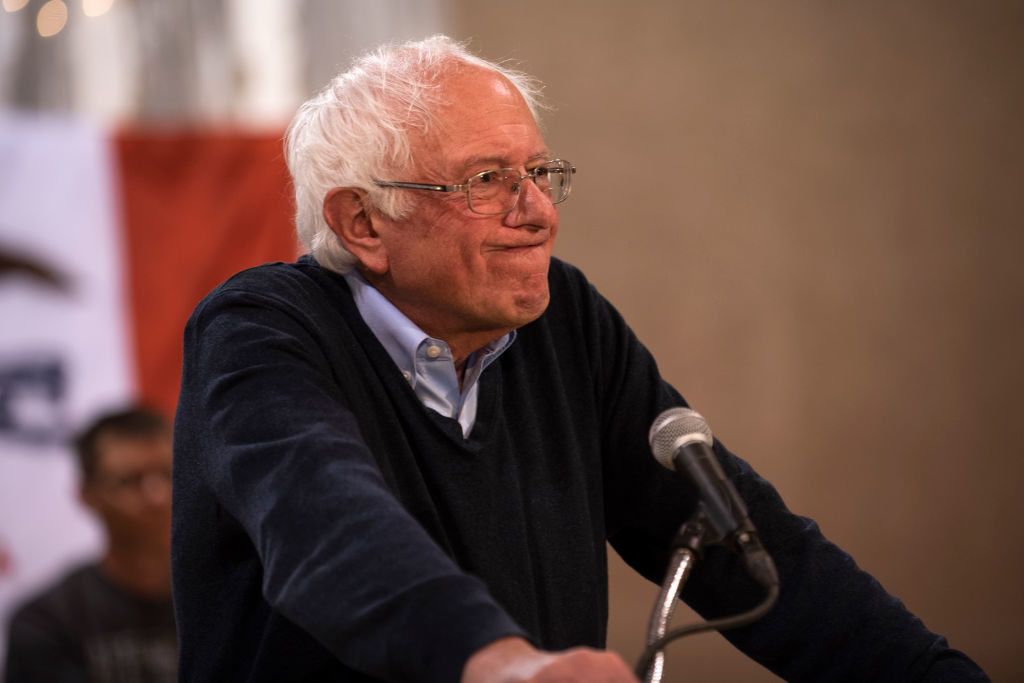Who’s the biggest loser? Joe Biden’s third try for the White House might look as doomed as Hillary Clinton’s run in 2016, but so far, Biden has followed a different and more promising trajectory. Instead, it’s Bernie Sanders who’s shaping up to be the Dems’ high-profile also-ran.
Clinton peaked in popularity — and polling — ahead of her 2015 announcement. Her status as the assumed nominee helped her clear the field. Only the villain from The Wire dared challenge her in the establishment lane at any length; big names like Biden, John Kerry and Andrew Cuomo all preferred not to obstruct the Clinton succession. The result was a vacuum, and as politics abhors a vacuum, it sucked in unkempt Bernie Sanders, previously considered in Washington a socialist sideshow. But the read in Kalorama was wrong. Sanders was scrappy, and anti-Clinton sentiment was running high, even on America’s left. Clinton almost blew the nomination race, and then she really blew the election, sauntering not towards coronation, but the biggest upset in generations.
Biden’s trajectory has gone the other way — at least so far. His running mate in 2008 and 2012, Barack Obama, remains the most popular figure in Democratic politics, if not American politics. Yet the 44th president is decidedly frosty toward Biden’s campaign to become the 46th. Obama discouraged a Biden run in 2016, and this time he’s signaling interest in other candidates: Pete Buttigieg, who’s in the race, and Eric Holder, his former Attorney General who passed on a run.
Biden’s announcement this spring was presaged by scandal. Peggy Noonan, dean of American political columnists, implored him not to run, lest the puritans lashed Biden, a hands-on politician, for a career’s worth of caressing. And, unlike Clinton, Biden looked weak enough to encourage 20 challengers. Unlike Clinton in 2016, Biden looked vulnerable on the day he announced his run. The smart money reckoned that once Biden the career gaffe artist started fumbling his campaign before the cameras, Sanders would beat him in the polls.
But that’s not what’s happening. Biden isn’t just treading water: he’s surfing out to a lead of 30 points or more in some polls. It turns out that America likes Joe. Furthermore, in the humming Trump economy, rank-and-file Democrats appear to be leaning towards Biden as a centrist, rather than taking a chance on the party’s vanguard, an alliance of millennials in a hurry and their geriatric socialist grandparents.
This is an enormous problem for Sanders. Again and again, the polls place him a sloppy second. And though it’s still preposterously early, it’s safe to say that the the Biden bump has altered the fundamental dynamics of the race.
Sanders had planned to pose as the quiet front-runner. The Democratic establishment might not be ready to anoint a populist insurrectionist, but Sanders, like Trump with the Republican base in 2016, thought that he had what the party’s voters wanted. Democratic operatives and veteran consultants whispered to anyone that would listen that Sanders, who had retained a permanent campaign infrastructure after coming up short in 2016, held a critical advantage in Democratic politics: the best ground game. The formula that supplied and maintained Barack Obama’s power had been mailing lists, volunteers, data, and pounding the pavement. Our Revolution, Sanders’s arm, was the heir to Organizing for America, the Obama mothership, and Sanders, like Obama, was awash in cash.
But Sanders’s campaign underestimated Biden out of the gate. And this time, Sanders’s Achilles heel appears to be even more exposed than it was to Clinton. African Americans are the lynchpin of any Democratic strategy, but so far, black Southern Democrats seem to like the idea of Barack Obama’s lieutenant as president, even if Obama himself doesn’t feel so warm about it. Last time round, South Carolina was Stalingrad for Sanders. It didn’t finish him off, but it lost him the war. Right now, it’s déjà vu all over again for the senator from Vermont.
Part of Sanders’s struggle has been recapturing the magic. Sanders is running against the Trump boom. The economy is better than it was four years ago, and the electorate are perhaps less receptive to his Menshevik message. In 2016, Rand Paul’s campaign ossified when it turned out there wasn’t much of a constituency for a decaffeinated version of his father, Ron Paul. Will Sanders lose his appeal if he goes Bernie-lite? As Matthew Walther wrote in The Week, it might make sense to Keep Bernie Weird.
Perhaps Sanders should go the other way: no more Mr Nice Bernie. The battle for the Democratic soul is a scrum between its traditional coalition — affluent urbanites and marginalized minorities — and a younger generation looking for something more radical. The establishment bracket is bustling, and Biden’s polling could soon be eroded by his principal peer, Buttigieg. Biden could also be challenged by Kamala Harris or Cory Booker, if they ever catch fire, and there are ten more challengers where they came from. Meanwhile, Bernie need only contend with Elizabeth Warren and, more distantly, the dovish firebrand Tulsi Gabbard, and perhaps, the UBI technocrat Andrew Yang too. But Gabbard and Yang aren’t going to stop Sanders. To win, Sanders may have to mercilessly squash his biggest challenger from the left, Warren.
Sanders’s best approach would be to take the advice of Carl Beijer in left-wing Jacobin. Sanders should close ranks, wicked early. Because if Sanders gets close to the nomination, he’ll face an Anyone-But-Bernie movement strong enough to make the NeverTrumpers look like the Washington Wizards. The anti-Sanders counter-reaction will be furious. Biden can draw on nostalgia for the Obama years, and on genuine support from centrists. He can also reel in disengaged voters late in the primaries. But Bernie still has his game.
‘Socialism is the politics of collective action,’ writes Beijer of Jacobin. ‘If we can’t even do better than the GOP on this, we will lose.’
Quite right.


















